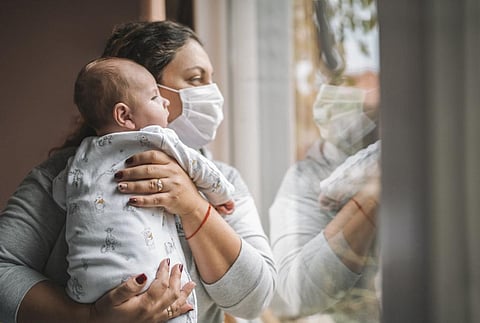

People acquire beneficial gut bacteria by exposure to diverse natural environments during the first days of life, and children born during the 2020 COVID-19 lockdowns may have been deprived of this opportunity, resulting in altered gut microbiome, an article in the journal Nature noted.
The conclusion was based on several studies on the topic published since the pandemic hit.
Our small and large intestines house a well-balanced ecosystem of microorganisms that aid the operations of a healthy body. These bacteria, fungi, parasites and viruses, picked up during delivery, breast-feeding and exposure to surroundings, help in digestion and boosting immunity.
“Its imbalance has been linked to psychiatric disorders, skin conditions and gastrointestinal issues,” according to the story in Nature published September 27, 2023.
“The first 1,000 days are critical to pick up a healthy microbiome,” Jun Sun, a microbiome researcher at the University of Illinois in Chicago, told the journal.
But remaining in the confines of their houses, where the surfaces they came in contact with as well as their hands were sanitised regularly, will have a lasting effect on the establishment of this valuable microbiome network in the gut, researchers found.
The piece cited a report published in the journal Scientific Reports on August 16, 2023. Natalie Brito, a developmental psychologist at New York University, and her colleagues studied the microbiome of 20 infants in the New York City area for nine months since the lockdown was imposed in March 2020.
They found “a lower diversity of microbes in each child and more-distinct profiles between children, compared with a cohort of similar babies that were born before the pandemic”, according to the Nature article.
The impact was found to be more distinct for certain bacteria, according to another report mentioned in the story. The paper was based on findings of a study on babies born during the lockdown in Dublin.
“The population of Bifidobacterium is usually affected negatively by antibiotic use and positively by breastfeeding. At the age of 12 months, children born during lockdown had higher than average levels of Bifidobacterium in their guts, likely because they were more likely to have been breastfed and less likely to have caught infections that would require antibiotics. Meanwhile, the population of Clostridia, a class of bacteria usually picked up from the environment, was lower,” the author of the Nature article observed based on the analysis published March 22, 2023 on medRxiv.
Apart from missing out on contact with nature in parks and playgrounds or a multitude of public environments such as marketplaces and stations, the children born amid the pandemic also lacked human contact.
“One in four babies hadn’t met another child of their own age” over the course of the study, co-author of the Dublin study, Susan Byrne, a paediatric neurologist at the Royal College of Surgeons in Ireland, told Nature.
Stress of parents was also a contributing factor to the altered microbiome development in these children, the story highlighted.
The findings of such studies lend weight to the ‘hygiene hypothesis’ put forward by a section of experts in the initial years of the pandemic. The theory was that growing up in sanitised environments will impair the development of vital immune cells in children.
In babies, pathogen-specific T-lymphocyte immune cells that eradicate harmful organisms multiply during new infections to help the body recover, according to an opinion piece in The New York Times written by an immunologist and a pediatrics professor from the Columbia University Vagelos College of Physicians and Surgeons.
After the body fights off the pathogen, “some persist as memory T cells with enhanced immune functions”, they wrote.
Over time, children develop increasing numbers and types of memory T cells, which remain throughout the body as a record of past exposures and stand ready to provide lifelong protection, the experts said.
Without the desired interactions, this process may be hindered in children. “Quarantine could have adverse effects on the development of the immune system in children who are not exposed to the usual viruses,” Eline Luning Prak, professor of pathology at the University of Pennsylvania, told non-profit news organisation The74million.
Their immunity system may not return to normal immediately as these children begin interacting with the surroundings after the lockdown, Prak posited. “The longer children remain in ‘hyper-hygienic’ conditions associated with quarantine, the more chance there is for the effects to be long-lasting,” she said in the story.